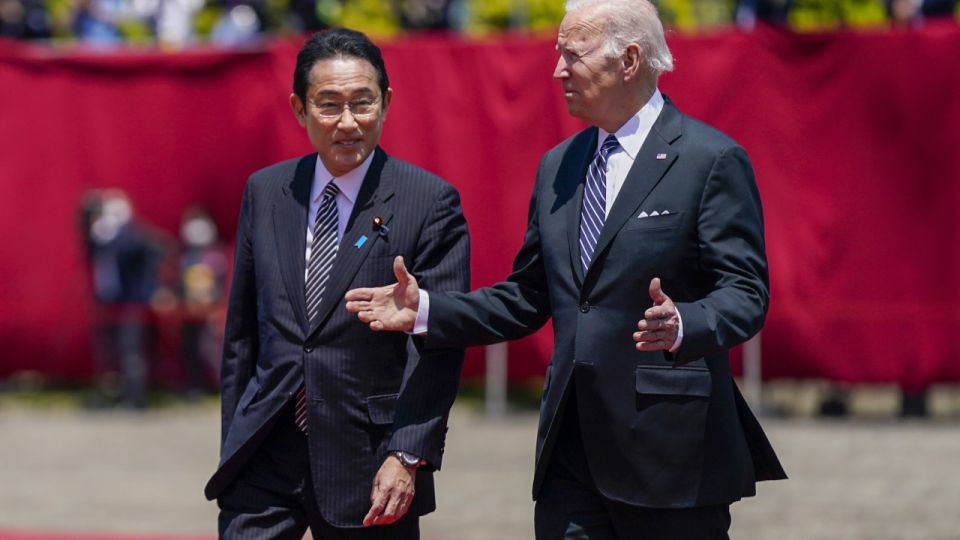May 25, 2022
SEOUL – During his trip to Japan this week, US President Joe Biden endorsed Japan’s bid for a permanent seat at the United Nations Security Council, and expressed support for the country’s plan to beef up its military.
While Japan becoming a permanent member of the UN’s highest decision-making body is unlikely, Biden’s support is interpreted by some as “lip service” for the Japanese prime minister, who promised close military cooperation as the US seeks to strengthen its regional presence to contain its strategic rival China.
At the same time, the US’ support for Japan’s military ambitions may present concerns for South Korea, Yuji Hosaka, a political science professor at Sejong University, told The Korea Herald. The US may push for a Korea and Japan to build a military alliance while they are still at odds on a series of historical disputes, Hosaka said.
South Korea’s Foreign Ministry also said Biden appears to have reiterated the US’ position, but that a related talk on reform of the UNSC has not been making much progress.
Permanent seat at UNSC
Currently, five countries — China, France, Russia, the United Kingdom and the US — are permanent members of the UNSC, and they have been at the center of many significant security issues around the world.
With the five countries having held that position for decades, calls have risen among non-permanent members for an expansion of the UNSC. The G4 nations — Japan, Brazil, Germany and India –have made the demand.
In addition to their respective demands for veto power, the G4 nations have also called for a “reform” of the UNSC, saying that the veto powers granted to the five permanent members are “undermining the legitimacy” of the UN’s highest decision-making body.
“Due to the use of veto, the Security Council has at times failed to fulfill its responsibility to maintain international peace and security,” Tokyo’s UN Ambassador Ishikane Kimihiro said in early March, following Russia’s veto against adopting the resolution condemning its own war of aggression against Ukraine.
But Japan being granted permanent membership at the UNSC is highly unlikely, experts say, as the reform of the UNSC depends on support from both permanent and non-permanent members. For the reform, at least two-thirds of UN member states should agree, and all of the permanent members of the UNSC, including Russia and China should approve.
Given the low possibility of Japan becoming a permanent member of the UNSC, Biden’s endorsement from his summit with the Japanese prime minister may come to highlight their close alliance, Choi Eun-mi, a research fellow at the Asan Institute for Policy Studies told The Korea Herald.
In the latest effort, Japan’s ruling Liberal Democratic Party has proposed that the government develop “counterstrike capabilities,” and to redefine its policy of “minimum self-defense capability,” stipulated in its Peace Constitution.
The country also seeks to double its defense budget, from the current 1 percent of the country’s gross domestic product to 2 percent in the next five years.

South Korean President Yoon Suk-yeol (left) and US President Joe Biden visits the Korean Air and Space Operations Center located at Osan Air Base in Pyeongtaek, 70 kilometers south of the capital, on Sunday. (Yonhap)
Japan’s status boost and Korea
At the same time, the US is openly supporting Japan’s ambition to increase its military capabilities, as the US seeks to boost its power in its escalating strategic competition with China.
In South Korea, the idea of Japan becoming a permanent member of the UNSC is widely unpopular, as the public sees it as inappropriate to grant such power to a country that continues to deny it committed any war crimes.
South Korea’s Foreign Ministry said on Tuesday that Japan’s efforts to boost its military capability should be aligned with its Peace Constitution that highlights on its self-defense capabilities.
“Japan’s self-defense and security policy should be aligned with the spirit of its Peace Constitution and should be carried out transparently, in the direction that can contribute to the peace and stability of the region,” said Foreign Ministry spokesperson Choi Young-sam in a regular press briefing on Tuesday.
“The Korean government’s stance is clear (on this matter). And I believe the US, our ally, also has a clear understanding of our position.”
Despite the low probability, Japan’s status upgrade at the UNSC would likely weaken South Korea’s standing in its disputes with Japan, which include a territorial spat over the sovereignty of the Dokdo Islets in the East Sea.
If Japan were granted a permanent seat at the UNSC, or were to attain the rights to counterstrike, it would pose a concern for the South Korean government, Hosaka of Sejong University said.
“What the US apparently wants ultimately is for Japan and Korea to defend Asia themselves. Going further, it can mean the formation of a security alliance between Japan and Korea,” Hosaka said.
“But because the two countries have territorial disputes, it is basically impossible to build a military alliance.”
For instance, should the two neighbors establish a military alliance, Japan would bring in its military forces into Korean territory in case a war breaks out on the Korean Peninsula. But with the territorial dispute unresolved over Dokdo, South Korea would have to worry about Japan taking over the disputed islet, the professor added.
In other disputes, such as Japan’s push to list Sado mine, a former gold and silver mine linked with wartime forced labor, as a UNESCO world heritage, South Korea may have a weaker standing to voice opposition.


